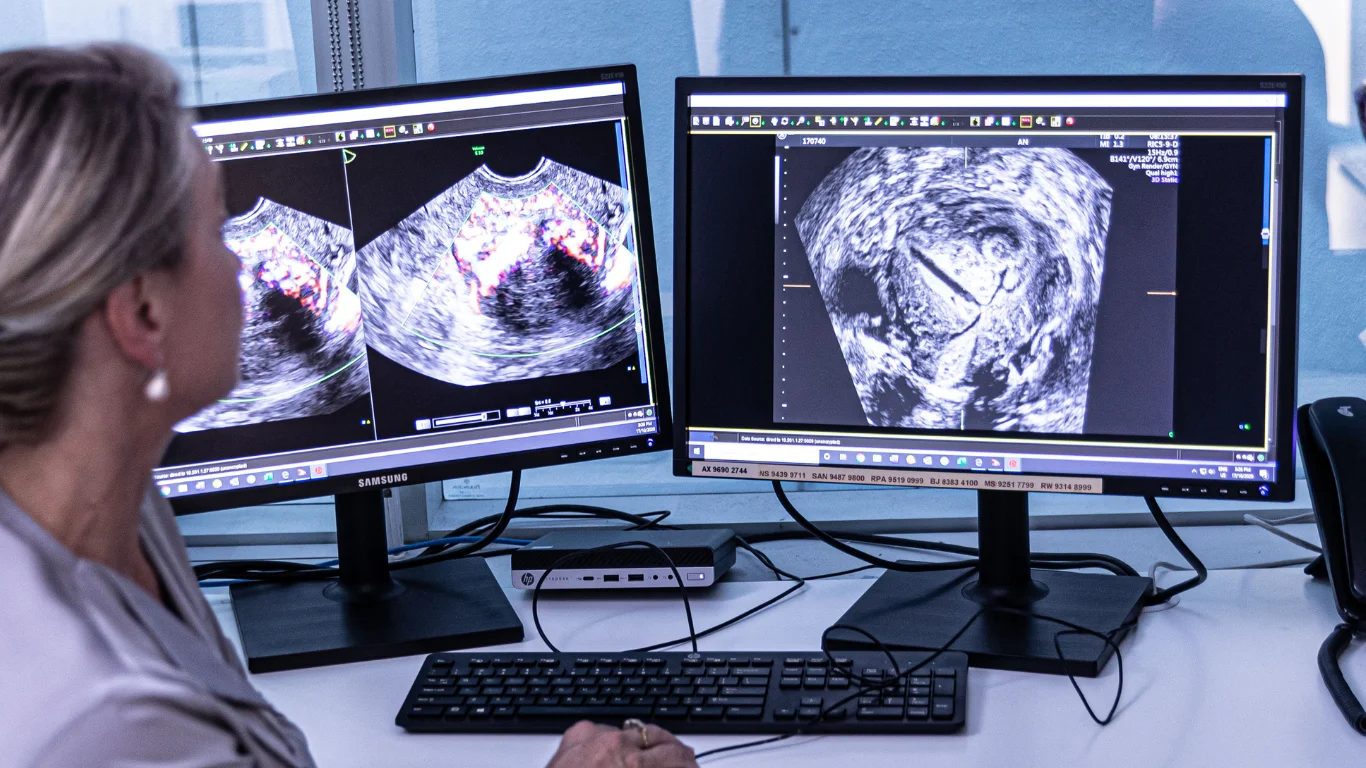Help - I’m pregnant!
Congratulations! Pregnancy is wonderful, but it can also feel overwhelming. At Ultrasound Care, we are here to support you in your pregnancy journey. There is so much to learn and experience during this new season.
What is going on with my body?
Pregnancy is a massive adjustment for your body. Growing a tiny human is no small feat.
Early in pregnancy, many women experience nausea and tiredness. These symptoms are due to hormonal changes.
“Morning” sickness can cause nausea throughout the day, and usually starts at around 6 weeks of pregnancy. For most women suffering from morning sickness, symptoms improve between 12 and 14 weeks. In some cases, morning sickness can be so severe that a woman may need to be hospitalised.
In addition to nausea and tiredness, there are multiple other symptoms that a woman may experience during pregnancy. For most women, pregnancy complaints are no more than a minor nuisance. However, some women experience incapacitating symptoms.

When treating a pregnancy-related ailment, there are 2 patients to be considered. Many regular treatments for common symptoms are not advisable during pregnancy because of their risk to the baby. There is no need to suffer in silence though, your doctor or midwife would be happy to advise you on the best approach to managing your pregnancy-related concerns.
How do I know if something is wrong during pregnancy?
It’s normal to feel anxious about the wellbeing of your pregnancy, particularly if you are pregnant for the first time. Anything that concerns you, is worth discussing with your doctor or midwife.

You should seek urgent medical advice if you experience any of the following symptoms during pregnancy:
- Severe headache
- Dizziness or fainting
- Vision difficulties
- Fever of more than 38°C
- Severe swelling of your face and hands
- Thoughts of self-harm
- Breathing difficulties
- Chest pain or palpitations
- Severe nausea and vomiting
- Severe abdominal pain
- Decreased foetal movements
- Vaginal bleeding or fluid leak
- Severe pain, redness or swelling of a limb
What can I expect from labour?
Childbirth is a deeply personal experience. Although much of this experience is beyond your control, you can prepare for it by being as informed as possible.
What can I expect from labour?
As you start to go into labour, you may experience:
- Lower abdominal cramps
- Lower backache
- A ‘show’ ( a blood-stained, mucous-like vaginal discharge)
- Diarrhoea
- Leaking of fluid from your vagina
- Contractions

In most cases, it is not necessary to rush to the hospital when the first symptoms of labour begin. However, if you experience any of these symptoms, it is a good idea to contact your doctor or midwife for advice. This is especially important if you are experiencing symptoms of labour and your baby is not yet due.
Stages of labour
Labour is divided into 3 stages:
The first stage of labour involves the thinning and opening of the cervix, and is divided into 3 phases:
The latent phase – This phase of labour may last for hours, or even days. It is usually the least painful part of labour, as your cervix dilates from 0 – 3 cm. Some women do not even notice the contractions that occur during this phase.
The active phase – This phase consists of stronger contractions of around 30- 60 seconds in length, which occur around 3 -4 minutes apart. During the active phase, your cervix dilates from 3 cm to around 8 cm.
The transition phase – This happens as your body prepares for the delivery of the baby, once your cervix is at least 8 cm dilated. During this phase of labour, contractions are frequent and intense. The transition phase of labour usually lasts between 15 and 60 minutes, but can take up to 2 hours.
The second stage of labour starts when your cervix is fully dilated, and continues until your baby is born. During the second stage of labour, you may feel the urge to push. Your doctor or midwife will assist you through this process. The second stage of labour may take up to 1 – 2 hours for a first time mum, especially if she has had an epidural. It is usually much quicker for a woman who has had a baby before.
This is the delivery of the placenta after the birth of the baby. This usually happens between 5 and 30 minutes after the baby is born. Your doctor or midwife will help to manage this stage of labour to prevent excessive blood loss.
Pain relief during labour
Labour pain can be managed with both natural and medical methods. Relaxation techniques can help women cope with labour pain, and modern medicine offers effective pain relief options.

What about a caesarean section?
A caesarean section is an operation to deliver a baby via a cut in the mother’s abdomen and uterus. In most cases, vaginal birth is the safest option for the delivery of your baby. In some cases, there may be problems that would prevent a safe vaginal birth. In these cases, a caesarean section is the safer option.
When are the “baby blues” more than just the “baby blues”?
Around 80% of women experience the “baby blues” between 3 and 10 days after a baby’s birth. For most women, this emotional low passes after a few days.
However, around 1 in 8 women develop postnatal depression (PND).
Having a baby brings huge physical, emotional and social changes. A sudden decrease in pregnancy hormones can affect the chemicals in your brain, increasing your risk of depression. Sleep deprivation, along with the emotional and social challenges of adapting to motherhood, can feel overwhelming.
Although the most likely time to develop depression is in the first few weeks after the baby’s birth, depression and anxiety can also occur during pregnancy.
Symptoms of depression include:
- Negative thoughts
- Tearfulness and irritability
- Feeling unable to cope
- Low self-esteem
- Feelings of guilt
- Feeling that life is meaningless
- Difficulty in sleeping
- Overwhelming tiredness
- Loss of appetite
- Anxiety or panic attacks
- Poor concentration
- Low sex drive
If you are experiencing any of these symptoms, it is important that you seek help. Your family doctor or a professional counsellor can help you recover. Many maternity and local hospitals also offer support services and resources for PND.
You could also call:
- The Maternal and Child Health Line (Available 24/7) at 13 22 29
- PANDA (Perinatal Anxiety and Depression Australia) helpline at 1300 726 306 (Available weekdays between 9 am and 7.30 pm, AEST/AEDT)
- Lifeline at 13 11 14
- Beyond Blue at 1300 224 636
Pregnancy and childbirth is a season of tremendous change, so remember to be kind to yourself and reach out if you need help.





